| Listing 1 - 7 of 7 |
Sort by
|
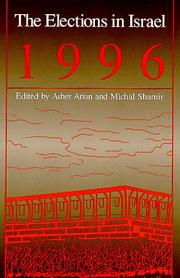
ISBN: 0791442373 0791442381 Year: 1999 Volume: *7 Publisher: Albany State university of New York press
Abstract | Keywords | Export | Availability | Bookmark
 Loading...
Loading...Choose an application
- Reference Manager
- EndNote
- RefWorks (Direct export to RefWorks)
#SBIB:328H514 --- #SBIB:324H42 --- Instellingen en beleid: Israël --- Politieke structuren: verkiezingen --- Elections --- Israel. --- Elections, 1996. --- Israel --- Israël --- Politics and government --- Politique et gouvernement --- Elections, 1996 --- 1993 --- -Elections --- ישראל. --- כנסת --- כנסת השתים־עשרה

ISBN: 0585284806 9780585284804 9780791442371 0791442373 9780791442388 0791442381 0791442373 0791442381 9780791495223 0791495221 9780791495223 Year: 1999 Publisher: Albany, NY State University of New York Press
Abstract | Keywords | Export | Availability | Bookmark
 Loading...
Loading...Choose an application
- Reference Manager
- EndNote
- RefWorks (Direct export to RefWorks)
Leading social scientists from Israeli and American universities, using different methods and representing diverse intellectual traditions, address the precedent-setting events of Israel's 1996 elections. The contributors discuss the meaning of collective identity, the role of religion and nationalism in modern Israel, the political behavior of Israeli Arabs, the secrets of success of the immigrant party. Also discussed are issues such as the impact of the direct election law on party organization, primaries and coalition-formation calculations, the repeated electoral failure of Shimon Peres, and the role of the media in the election campaign.The 1996 elections in Israel represented a "first" in Israeli politics in many ways. For the first time Israelis directly elected their prime minister and, in simultaneous but separate elections, they elected their 120-member Knesset (parliament). Also, it was the first time that elections were held after the mutual recognition of Israel and the Palestine Liberation Organization following the Oslo accords and it was the first election held after the assassination of Prime Minister Yitzhak Rubin.The political parties made widespread use of primaries in 1996, and hundreds of thousands of new immigrants from the former Soviet Union cast their first ballots. The large support for a party supported by former-Soviet immigrants highlighted the emergence of sectarian interests. This was also expressed in the surge for the two Arab parties from five seats in 1992 to nine seats in 1996, and for the three Jewish religious parties whose combined representation grew from 16 to 23 seats.
ISRAEL --- ELECTIONS --- POLITICAL SCIENCE --- Israel --- Elections --- Political Science --- Political science
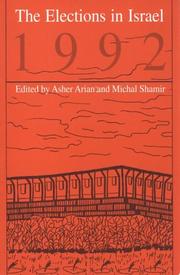
ISBN: 0791495213 0585045194 9780585045191 9780791495216 0791421759 0791421767 9780791421758 9780791495216 9780791421765 Year: 1995 Publisher: Albany State University of New York Press
Abstract | Keywords | Export | Availability | Bookmark
 Loading...
Loading...Choose an application
- Reference Manager
- EndNote
- RefWorks (Direct export to RefWorks)
As the momentum toward peace in the Middle East surges and wanes, the intensity of politics in Israel takes on added relevance. There can be little doubt that the historic Israel-PLO peace accord could not have occurred were it not for the turnabout elections of 1992. This volume, the seventh in a series begun in 1969, carries on the tradition of offering in-depth analyses of the major issues, actors, and parties involved in Israeli politics.
Israel. --- ישראל. --- כנסת --- כנסת השתים־עשרה --- Elections, 1992. --- Israel --- Politics and government. --- Elections --- Israël --- Politique et gouvernement
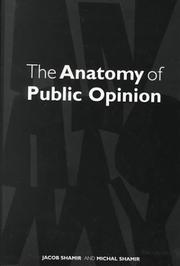
ISBN: 0472110225 Year: 2000 Publisher: Ann Arbor (Mich.) : University of Michigan press,
Abstract | Keywords | Export | Availability | Bookmark
 Loading...
Loading...Choose an application
- Reference Manager
- EndNote
- RefWorks (Direct export to RefWorks)
Book
ISBN: 1003267912 1000729303 1000729338 1003267912 1032213396 Year: 2022 Publisher: Milton Taylor & Francis Group
Abstract | Keywords | Export | Availability | Bookmark
 Loading...
Loading...Choose an application
- Reference Manager
- EndNote
- RefWorks (Direct export to RefWorks)
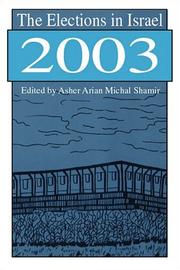
ISBN: 0765802686 Year: 2005 Publisher: New Brunswick : Transaction Publishers,
Abstract | Keywords | Export | Availability | Bookmark
 Loading...
Loading...Choose an application
- Reference Manager
- EndNote
- RefWorks (Direct export to RefWorks)
Elections --- Elections --- History. --- Histoire --- Israel. --- Elections, 2003. --- Israel --- Israël --- Politics and government --- Politique et gouvernement
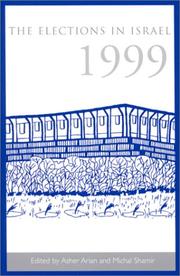
ISBN: 0791488810 0585463999 9780585463995 0791453154 9780791453155 0791453162 9780791453162 9780791488812 Year: 2002 Publisher: Albany : State University of New York Press,
Abstract | Keywords | Export | Availability | Bookmark
 Loading...
Loading...Choose an application
- Reference Manager
- EndNote
- RefWorks (Direct export to RefWorks)
This volume highlights Israel's 1999 elections, in which the prime-ministerial race between incumbent Benjamin Netanyahu and Ehud Barak ended with Barak winning by the biggest landslide ever in Israel. Although some observers interpreted these results as a fundamental shift in public opinion, there is little evidence to support this. The book shows how old patterns funneled into a new system of voting produced the 1999 results, where a weak candidate (Barak) bested a wounded prime minister (Netanyahu) abandoned by most of his political allies. Leading social scientists from Israeli and American universities, using a variety of approaches and coming from diverse intellectual traditions, address topics including the emergence of political blocs, strategic voting, and split ticket voting. In addition to major party performance, special interest parties—who did better than ever in 1999—are also discussed, such as the haredi, ultra-orthodox, non-Zionist Shas, the anti-haredi secular Shinui, two parties appealing to former Soviet émigrés and Arab parties.
Elections --- Israel. --- ישראל. --- כנסת --- כנסת השתים־עשרה --- Elections, 1999. --- Israel --- Politics and government --- Israël --- Politique et gouvernement
| Listing 1 - 7 of 7 |
Sort by
|

 Search
Search Feedback
Feedback About UniCat
About UniCat  Help
Help News
News